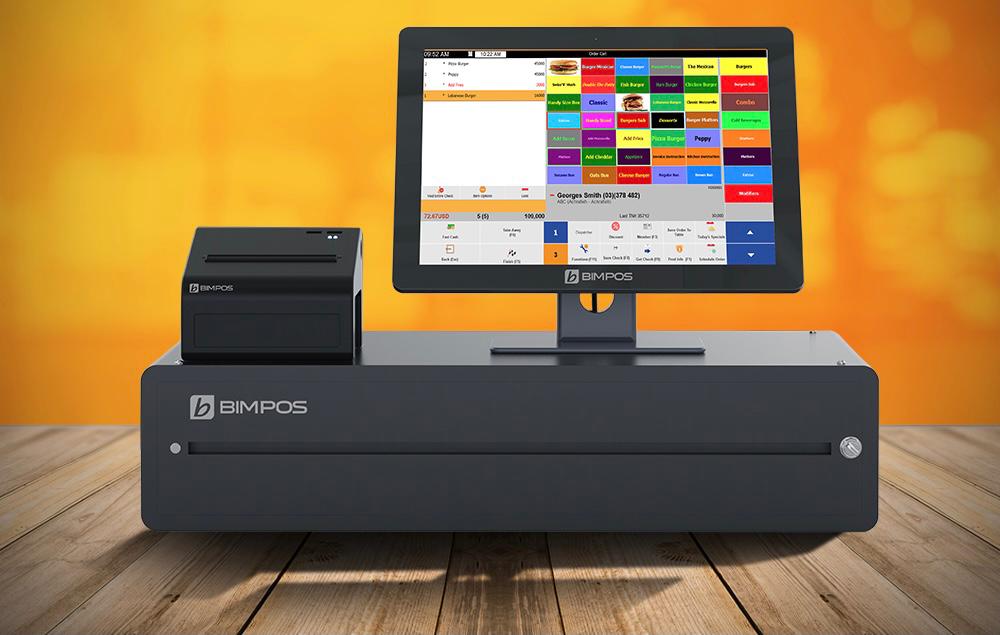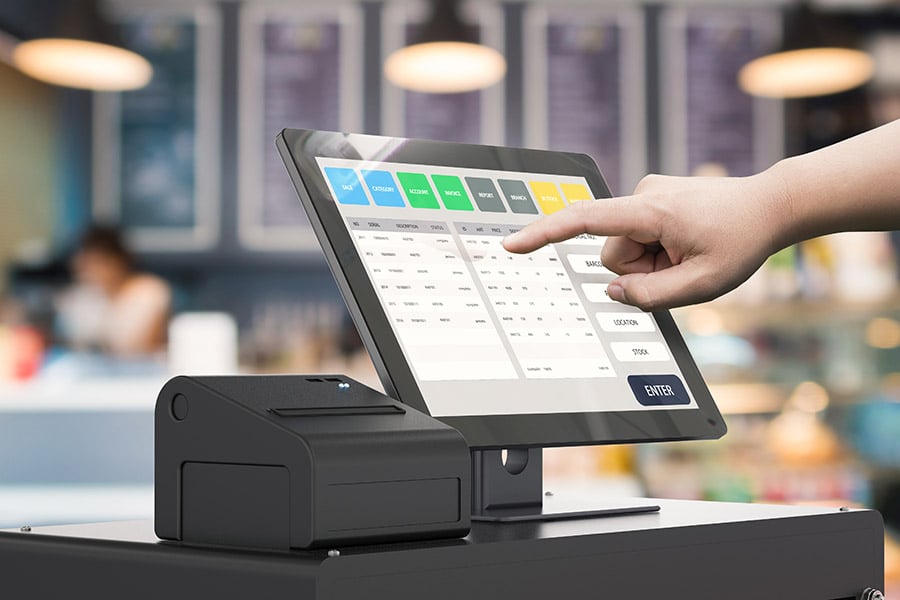More About Pos System For Small Business
More About Pos System For Small Business
Blog Article
A Biased View of Restaurant Pos

POS Software: Retail Point-Of-Sale Solutions Streamline Deals
The Main Principles Of Pos Systems

Hardware Parts of a Point of Sale System What makes a POS system tick? It's not simply software; the hardware plays a starring function. Consider it as the body to the software application's brain. Without the right hardware, even the most sophisticated POS software is just a pretty face. Vital POS Hardware So, what are the must-haves? Let's break it down. The main processing unit, frequently a computer or tablet, is the heart of the operation. The monitor or touchscreen display allows staff to communicate with the system. A barcode scanner speeds up the checkout here procedure. Remember the days of by hand going into each code? The trusty invoice printer offers consumers with a record of their purchase. A money drawer keeps your cash safe and organized. A card reader allows consumers to pay with credit or debit cards. Diving Deeper: Beyond the Basics But wait, there's more! Depending upon your organization, you may require specialized hardware. For example, a dining establishment might incorporate cooking area printers to relay orders, while a store may use label printers for product tagging. Ever wonder how your regional bakeshop quickly prints those delicious-looking labels? Selecting the Right Hardware: A Balancing Act Choosing the best hardware isn't practically buying the most costly equipment. It's about finding the sweet area between performance, toughness, and spending plan. A small company just starting might choose for a more basic setup, while a high-volume merchant will require robust, high-performance devices. Is it much better to purchase brand-new or utilized? Consider your alternatives carefully. A brand-new system uses the most recent technology and service warranty security, however a reconditioned system can conserve you cash. The Future of POS Hardware What does the future hold? Anticipate to see even more integration with mobile gadgets, biometric scanners for worker authentication, and advanced analytics control panels displayed on bigger, clearer screens. Think of a world where stock is immediately upgraded in real-time as items are scanned-- a world where you can track your very popular item from throughout the world. The possibilities are limitless, and the hardware is continually progressing to satisfy the needs these days's businesses. Are you ready to update your point of sale system?
Software Application Features and Capabilities: The Heart of Your POS System
Ever watch a seasoned barista slide through a busy morning rush? Their trick isn't simply caffeine; it's a smooth dance with their POS system. The software application is the conductor of your business symphony, managing whatever from sales to stock. What notes should you be listening for? What capabilities truly matter in today's market?
Inventory Management: Beyond Counting Beans
Forget spreadsheets that haunt your dreams. Modern POS systems use real-time stock tracking, informing you when your stock of artisanal coffee beans dips precariously low. Think about it as a digital guardian angel, avoiding those awkward "Sorry, we're out!" minutes to clients. What if you could likewise anticipate need based on historical information? Many systems now use forecasting tools, a powerful weapon against overstocking and lost sales. This assists prevent the situation of running out of popular items or collecting excess stock of slow-moving items, both of which can constrain money flow and space.
Sales Reporting and Analytics: Decoding the Data
Sales data is the brand-new gold, and your POS system is the miner. Forget simply knowing how much you sold today. Dive deep into the information to discover patterns, recognize your very popular products, and understand client habits. Which menu product sets perfectly with the day-to-day special? Which promo resonated most with your clientele? These insights are not just intriguing; they're actionable intelligence. Without reliable sales reporting, navigating the intricacies of business decision-making becomes like sailing without a compass, increasing the opportunity of errors and missed out on opportunities.
Consumer Relationship Management (CRM): Structure Bridges, Not Walls
Keeping in mind a routine client's name and favorite order is lovely, but scaling that individual touch is difficult. POS systems with CRM capabilities enable you to track consumer purchase history, preferences, and even birthdays. Picture instantly providing a discount rate on their birthday-- a small gesture that cultivates loyalty and motivates repeat service. There is the prospective snag of bad information quality, which can lead to unreliable consumer profiles and inefficient marketing efforts.
Payment Processing: Enhancing the Deal
The checkout experience can make or break a sale. Smooth integration with different payment approaches-- credit cards, mobile wallets, even copyright-- is non-negotiable. Can your system deal with split payments? Does it use secure tokenization to safeguard customer data? A clunky payment procedure is like hitting a sour note in your company symphony, potentially disrupting the entire performance. Ensuring compatibility with evolving payment innovations and adherence to security requirements are vital for preserving customer trust and operational efficiency.
Staff Member Management: Keeping the Team in Sync
From clocking in and out to handling authorizations and tracking efficiency, employee management features streamline operations and improve responsibility. Is scheduling a problem? Many POS systems use integrated scheduling tools, optimizing staffing levels based upon predicted demand. A typical barrier that is frequently neglected is the difficulty of integrating worker management functionalities with payroll systems, which can cause errors and ineffectiveness in wage estimations.
Advanced Characteristics: Leveling Up Your Operations
- Table Management: Suitable for restaurants, this feature enables you to imagine your dining space, track table status, and handle reservations.
- Commitment Programs: Reward your best consumers and motivate repeat organization with integrated loyalty programs.
- Online Ordering Integration: Flawlessly incorporate your POS system with online purchasing platforms to expand your reach.
Picking the best POS system is about more than simply functionality; it has to do with discovering a partner that can grow with your company. Consider your existing needs, anticipate future development, and do not be scared to ask the difficult concerns. The right software can transform your company from a chaotic cacophony into a harmonious masterpiece.
Industry-Specific POS System Applications
Think about the regional bakery, bustling with morning clients yearning fresh croissants. A generic POS system might manage deals, however can it handle intricate dishes, track active ingredient stock, or immediately adjust production schedules based on sales data? Most likely not. That is where the charm of industry-specific POS systems shines.
Dining establishments and Hospitality
For dynamic dining establishments, speed and accuracy are critical. The number of times have you seen servers handling orders, adjustments, and splitting bills, all while trying to offer excellent service? A dining establishment POS system streamlines these procedures, enabling table management, cooking area order tickets, and even online ordering integration. These systems frequently consist of features like ingredient-level stock tracking, essential for managing food costs and reducing waste. Ever wonder why your favorite meal is sometimes not available? It may come from a lack of proper inventory management.
- Table Management
- Kitchen Order Tickets
- Online Ordering Integration
- Ingredient-Level Inventory Tracking
Retail Solutions
Retail, with its varied stock and client interactions, demands a various set of tools. Envision a shop clothes shop struggling to keep an eye on sizes, colors, and seasonal collections using a basic checkout system. An industry-specific retail POS system uses features like barcode scanning, consumer commitment programs, and in-depth sales reporting. These systems can even incorporate with e-commerce platforms, providing a seamless omnichannel experience for customers. Did you understand some retail POS systems can predict future sales trends based on historical information? Now that is effective!
The Hazards of an Inequality
Picking the incorrect POS system can develop considerable operational difficulties. A clothing store using a restaurant POS, for example, would discover it inappropriate for managing inventory with sizes and colors. The absence of appropriate reporting and analytics might cause mistaken acquiring choices and lost income. The outcome could be comparable to attempting to fit a square peg in a round hole.
Secret Considerations
Selecting an industry-specific POS system needs careful evaluation. Consider your organization's unique needs and functional workflows. Does the system incorporate with existing software? Does it provide the needed reporting capabilities? Is it scalable to accommodate future development? A well-chosen POS system is not simply a deal tool; it's a tactical asset that can drive effectiveness, enhance client complete satisfaction, and eventually, improve your bottom line. Remember, it is a financial investment in your company's future, not just a cost.
Security Considerations for Point of Sale Systems
Ever heard the tale of the mom-and-pop shop that lost whatever due to the fact that of a single, neglected security defect in their POS system!.?. !? It's a cautionary tale, and it highlights a crucial element typically eclipsed by the allure of expensive functions and streamlined operations. The truth is, a POS system is only as good as its security. What great is a system that crunches numbers in a flash if it permits criminals to swipe consumer's data just as quickly?
The Vulnerability Minefield
The digital landscape is a battleground. Every POS system, no matter size or elegance, is a possible target. Are you truly got ready for the threats hiding around the corner? The genuine pinch comes when you discover that your out-of-date software application has a gaping hole that hackers can make use of, turning your organization into an unwitting accomplice in identity theft. The problem is that hackers are crafty and are always changing their techniques.
Common Security Gaps and Professional Tips
- Weak Passwords: "Password123" isn't cutting it. Usage strong, special passwords for all POS system accounts and change them regularly. Two-factor authentication is a must.
- Unsecured Networks: Your Wi-Fi is like leaving the front door open. Secure your network with strong encryption (WPA3 if possible) and consider a separate network for your POS system.
- Outdated Software: Software application suppliers patch security holes all the time. Failing to update is like welcoming trouble. Set up automatic updates or schedule regular maintenance.
- Employee Training: Your staff is your very first line of defense. Train them to recognize phishing efforts, secure passwords, and report suspicious activity.
Data Encryption: Your Shield Versus the Dark Arts
Consider data encryption as a secret code. It scrambles sensitive details, like credit card numbers, making it unreadable to unauthorized users. Without file encryption, your clients' financial details resemble sitting ducks, ripe for the selecting by cybercriminals. It's not almost safeguarding your customers; it has to do with protecting your reputation and preventing hefty fines.
PCI Compliance: The Rulebook You Can't Overlook
If you accept credit cards, you're bound by the Payment Card Industry Data Security Requirement (PCI DSS) It's a set of security standards created to secure cardholder information. Stopping working to comply can lead to fines, penalties, and even the loss of your ability to process credit card payments. It's a headache, yes, but it's a needed one. Consider PCI compliance as the expense of doing business in the digital age.
Consider this: every deal processed through your point of sale is a potential entry point for harmful actors. By carrying out robust security steps, you're not simply safeguarding your organization; you're securing your customers' trust and ensuring the long-term practicality of your operations. The security of your POS system isn't just a technical concern; it's a company essential. It requires continuous vigilance, proactive steps, and a commitment to remaining ahead of the curve.